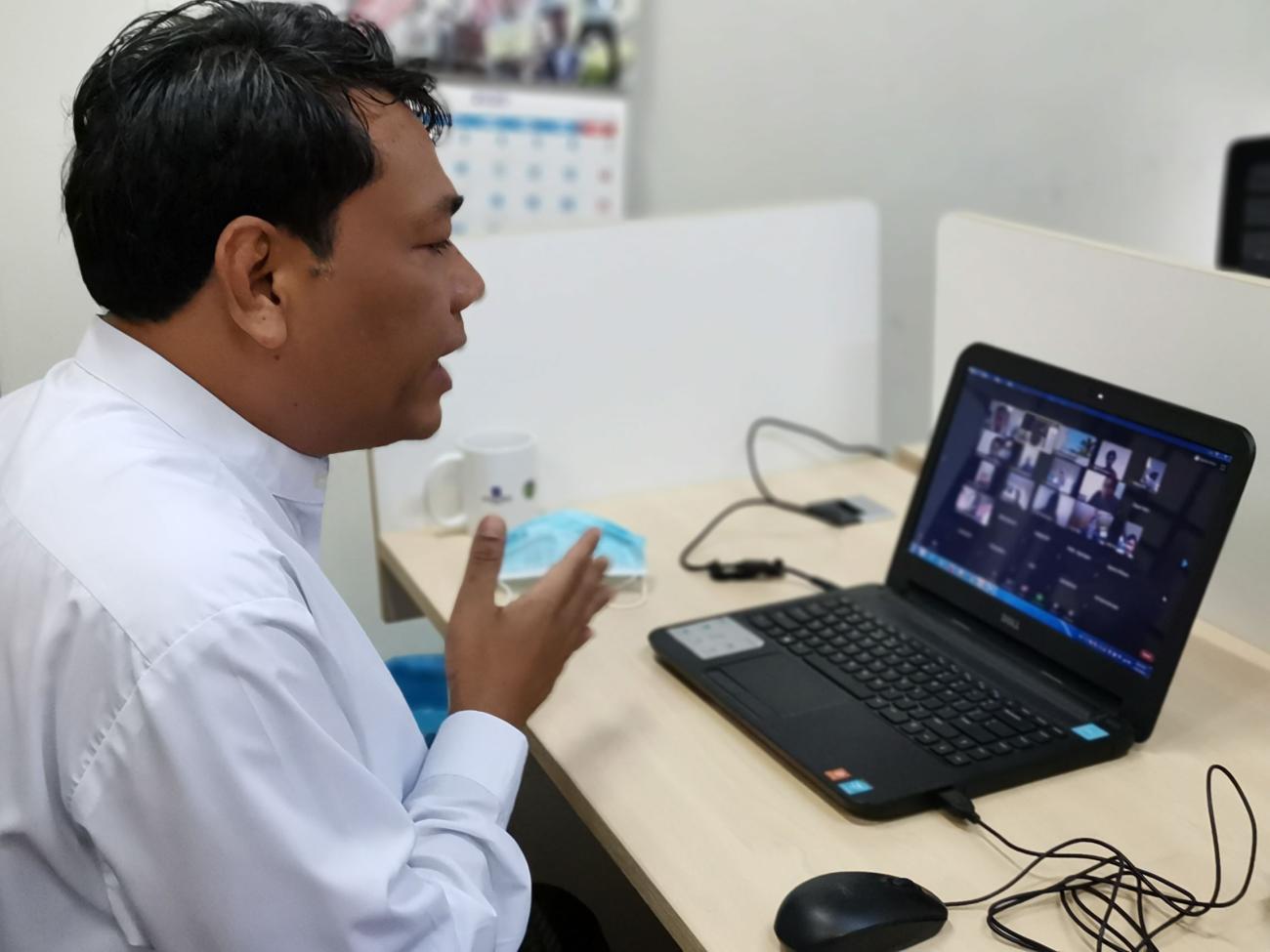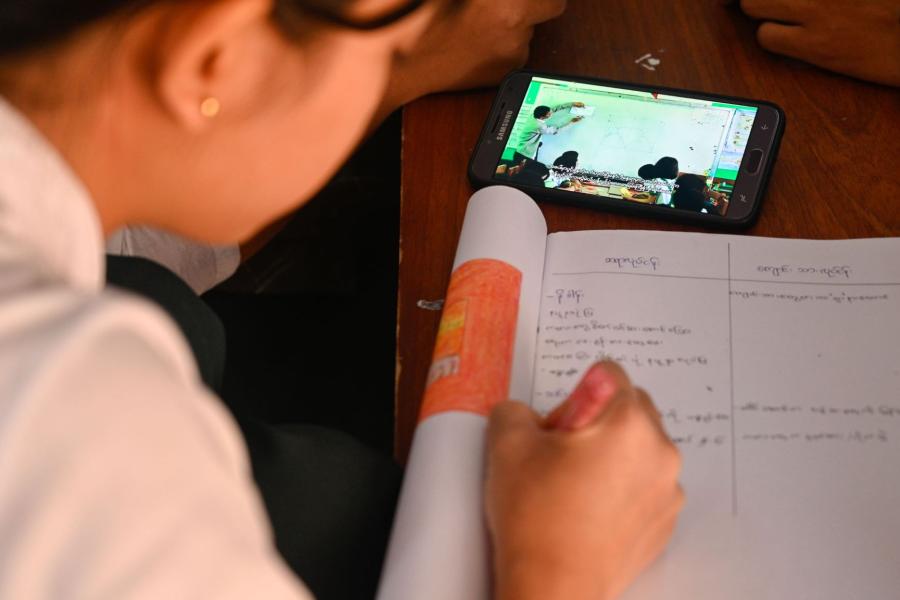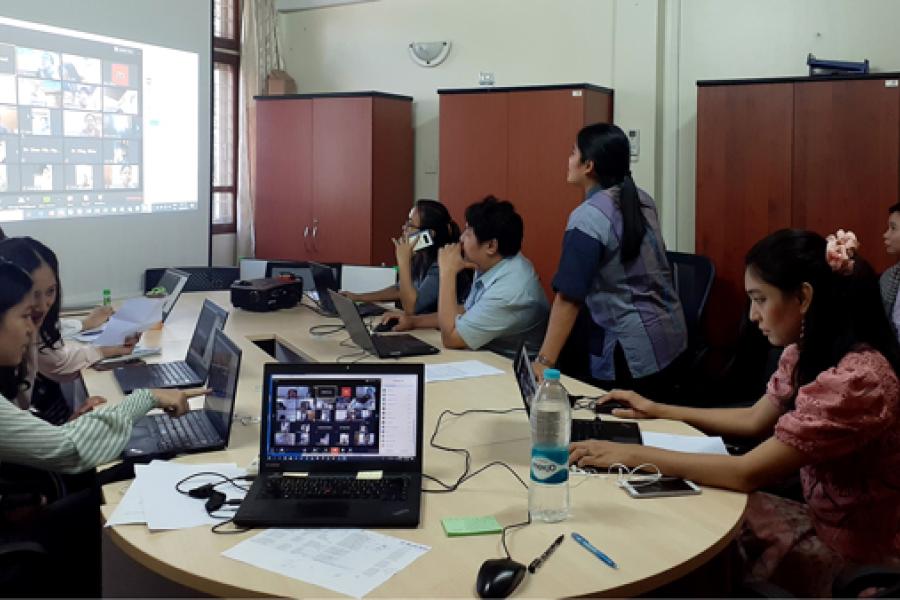The United Nations in Myanmar is working to counter disinformation on COVID-19 while ensuring continuity of education

The UN in Myanmar has come together as one to support COVID-19 preparedness and response. The next in a series of articles highlights UNESCO's contribution.
Efforts to strengthen and maintain learning processes across the country
With schools scheduled to begin reopening only in the third week of July, 11.6 million students enrolled in Myanmar’s education system will face some lost instructional time, including at least 1.5 months for children enrolled in Basic Education. UNESCO supported the Ministry of Education in the development of the sector-wide COVID-19 Response and Recovery Plan to ensure continuity of education in Myanmar during and after the pandemic. As a disaster-prone country exposed to high risk of natural hazards, this critical component of the framework will help the education system be more resilient, and more prepared to respond effectively to crises, such as the COVID-19 pandemic, in the future.
The education sector in Myanmar is undergoing wide-ranging reforms, which meant that many critical activities could not be delayed or postponed when the pandemic hit. Among the reforms is the new curriculum for the Teacher Education Colleges which UNESCO, under the Strengthening pre-service Teacher Education in Myanmar (STEM), is developing with the Ministry of Education. Faculty members at the colleges needed support in implementing the new curriculum, which was launched in December 2019, while the development process had to continue. UNESCO responded quickly to explore online modalities to connect with the 25 Education Colleges located across the country and to train faculty members in using these tools. Between March and June, some 100 online events (teleconferences, trainings, workshops, webinars, etc.) were organized to keep the reform process moving. Additionally, a multimedia package for curriculum training was developed and provided for some 2,000 faculty members of the 25 Education Colleges which also included support through a dedicated E-library, YouTube, and Facebook.
Protecting the mental wellbeing of frontline journalists, teaching and non-teaching staff
Access to accurate, relevant and timely information is critical to combat the pandemic. In this regard, journalists, who are at the frontline in fighting misinformation and delivering updated and accurate information to the public, often lack access to psychosocial support despite the risks and trauma they routinely encounter. To address this, UNESCO, in collaboration with the Myanmar Press Council, organized online trainings on psychosocial support and wellbeing in May and June to provide journalists with skills to cope with the stress from reporting in challenging situations.

In preparation for the reopening of Education Colleges, with support from the Ministry of Education, UNESCO established a Psychosocial Support Focal Point System to support the health, safety and wellbeing of teaching and non-teaching staff and student teachers. Focal persons were provided with a
two-day online training on psychosocial support and psychosocial first aid. Additional training sessions will be delivered in the recovery phase to further equip focal persons with psychosocial support and social emotional learning competencies to support their colleagues and students in future crises. With a delay of several weeks anticipated for the reopening of Education Colleges, UNESCO will support the Ministry of Education in mapping and prioritizing activities to ensure that all students are able to achieve their learning outcomes.
Countering disinformation on COVID-19
In order to raise public awareness and to encourage positive action to counter disinformation on COVID-19, media and information literacy (MIL) infographics and animation videos on disinformation in Myanmar language were made available through social media platforms. UNESCO also re-produced 23 MIL infographics in Myanmar language, which were shared with the Ministry of Information, Myanmar media outlets and CSOs for further distribution through their platforms. Additionally, public service announcements (PSAs) were translated into Myanmar language and distributed to radio stations across the country. The PSAs have been re-produced and used by community radios, commercial radios and notably, MRTV Radio, which has over 80 per cent listenership. MRTV Radio has since re-produced and broadcasted the PSAs in 17 additional ethnic languages.
Efforts to counter disinformation and hate speech, including a campaign against negative messaging, including stigma and discrimination, related to COVID-19 will continue to be expanded. The campaign will target the general public with key messages conveyed through a range of materials and channels. To complement the efforts of psychosocial support for journalists, UNESCO is finalizing the “Guidelines for Journalists Covering COVID-19: Professional Standards and Tips for Physical and Psychological Well-being” in collaboration with Myanmar Press Council. The guidelines will be available in both English and Myanmar versions.
A momentum to build back better
These extraordinary times have posed many challenges but it also presents opportunities to develop innovative solutions and draw on the lessons learned for the education sector. These experiences will contribute to building momentum in building back better the education sector. The COVID-19 pandemic has brought to the forefront the critical role played by the media in providing accurate and up-to-date information, and the risks faced by journalists working at the frontline which should inspire increased support to media development.




